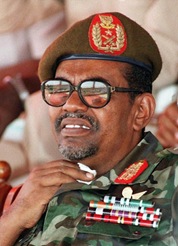The International Criminal Court (ICC), in a statement issued Monday, accused Sudan’s President Omar al-Bashir of "genocide by killing, genocide by causing serious bodily or mental harm and genocide by deliberately inflicting on each target group conditions of life calculated to bring about the group’s physical destruction," and issued an arrest warrant. Bashir becomes the first sitting head of state to be charged with genocide. The addition of genocide charge follows the March 2009 indictment of Bashir for war crimes and crimes against humanity, for which another arrest warrant is pending, and has added further diplomatic pressure on his isolated regime. Bashir has denied these charges.
 Pre-trial chamber at the ICC initially denied inclusion of genocide to the 2009 indictment based on the Rome Statue, but this was overturned on appeal as judges found "there are reasonable grounds to believe him responsible for three counts of genocide."
Pre-trial chamber at the ICC initially denied inclusion of genocide to the 2009 indictment based on the Rome Statue, but this was overturned on appeal as judges found "there are reasonable grounds to believe him responsible for three counts of genocide."
BBC reported Sudanese Information Minister Kamal Obeid as saying, "The adding of the genocide accusation confirms that the ICC is a political court. The ICC decision is of no concern to us."
A spokesman for Darfuri rebel group the Justice and Equality Movement, told AFP news agency the development was "a victory for the people of Darfur and the entire humanity," BBC said in its report.
The Appeals Chamber, which deliberated on the issue of including the count of Genocide in the indictment, explainedthat it was not concerned with the question of whether Mr Omar Al Bashir is, or is not, responsible for the crime of genocide. Rather, the Appeals Chamber addressed a question of procedural law, namely whether the Pre-Trial Chamber applied the correct standard of proof when disposing of the Prosecutor’s application for an arrest warrant.
In its 4 March, 2009, decision, Pre-Trial Chamber I rejected the Prosecutor’s application in respect of genocide stating that it would issue an arrest warrant for genocide only if the only reasonable conclusion to be drawn from the Prosecutor’s evidence, based on “proof by inference”, was that there were reasonable grounds to believe in the existence of genocidal intent.
The Appeals Chamber said the scienter (knowledge or intent) requirement amounts to requiring the Prosecutor to disprove any other reasonable conclusions and to eliminate any reasonable doubt, and added that this standard of proof to be too demanding at the arrest warrant stage, which is governed by article 58 of the Rome Statute.
"This amounted to an error of law," the appeal chamber said, and overturned the pre-Trial chamber’s decision opening the way for adding Genocide charges to Bashir’s indictment.
Non-signatories of Rome Statute
Sudan joined as a signatory party to the Rome Statue which governs the ICC in 2000, but did not ratify the treaty. Sudan has refused to surrender Bashir, who was re-elected this year in a U.N.-backed election to a five year term.
Sri Lanka campaign for Rome ratification
Sri Lanka has not signed the Rome treaty and has refused to consider calls to join other nations as members of the Rome treaty.
ICC Member States (110) as of 21 July 2009
In March this year Bangladesh became the first country in the South Asian sub-region to ratify the Rome Statute becoming the 111th member of the group of Nations to abide by the laws of the International Criminal Court (ICC), and thereby, actively cooperate in areas such as providing evidence of war-crimes and crimes against humanity, surrendering indicted individuals and holding national trials.
Only 7 countries in the Asian continent, Afghanistan, Bangladesh, Cambodia, Mongolia, the Republic of Korea and Timor‐Leste and Japan, have ratified the Rome Statute.
(For updates you can share with your friends, follow TNN on Facebook and Twitter )
